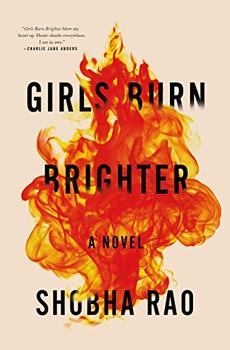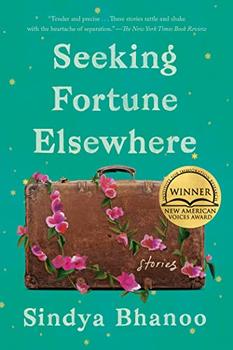Summary | Excerpt | Reading Guide | Discuss | Reviews | Beyond the book | Read-Alikes | Genres & Themes | Author Bio

What does it take to win your own freedom? What will you do for love? How do you take power when it was never given to you? Set in the small village of Indravalli in India in 2001, Girls Burn Brighter answers these questions and more, as it spins its take on what roles freedom, love, and power play in the lives of two young, impoverished girls growing up in rural India. Savitha and Poornima are female in a society where everyone wants a son, and no one wants to pay for a daughter's dowry. In this world, the relationships between sex, class, freedom, love, marriage, power, and destiny are hopelessly intertwined, and Savitha and Poornima are at the bottom of the totem pole.
At the novel's outset, Poornima's father hires Savitha to help weave and sell saris, and the girls find an instant connection. Savitha shows Poornima how to be confident and independent, to take control of her life despite external circumstances. Together, they enjoy an innocent, short-lived happiness, finding small delights in everything from bananas to flute song. But when Savitha is forced to leave Indravalli, and Poornima is married off against her will, tragedy after tragedy befalls the two girls as they face prostitution, human trafficking, and domestic abuse.
Girls Burn Brighter begins with wonder and excitement, of friendships forming and lives beginning. But when every other hope and happiness has been stripped from Poornima and Savitha, they long for each other, and the innocent memory of their childhood friendship. Rao describes girls as losing their girlhood when they lose the "sense of their own light," and the novel follows Poornima and Savitha's struggle to save and protect this light despite everything that happens. Throughout, their hope, however besieged, manages to stay constant, a secret undercurrent that is protected from the horrors depicted.
Without Rao's distinctive style, Girls Burn Brighter might have become unbearably dark. But her earnest and graceful prose seamlessly twists itself to fit the mood and perspective of the narrator, capturing despair and love with stunning sincerity. When we first meet Savitha, she enters Poornima's life "with the grace of a strong and swaying palm." Poornima's memory of her mother is of a woman with eyes like "deep black pools, with tiny silver fish gleaming in them when she laughs." Even in the lowest points, small moments are imbued with beauty and grace, granting a reprieve from the tragedy. Poornima and Savitha's spirits and bodies might come under attack and their eyes are opened to a terrible new world but, while narrating the characters' harrowing journey, Rao's words bring a sense of concealed, carefully guarded hope to the story.
Girls Burn Brighter is an extraordinary and heart-rending tale of two girls with all the odds against them, who nevertheless find a way to control and shape their own destiny. With vivid language and breathtaking sincerity, Shobha Rao weaves together the lives of Poornima and Savitha, pitting the two girls' friendship against the world, and proving that power can be taken—as well as granted.
![]() This review was originally published in The BookBrowse Review in March 2018, and has been updated for the
March 2019 edition.
Click here to go to this issue.
This review was originally published in The BookBrowse Review in March 2018, and has been updated for the
March 2019 edition.
Click here to go to this issue.

If you liked Girls Burn Brighter, try these:

by Marjan Kamali
Published 2025
From the nationally bestselling author of the "powerful, heartbreaking" (Shelf Awareness) The Stationery Shop, a heartfelt, epic new novel of friendship, betrayal, and redemption set against three transformative decades in Tehran, Iran.

by Sindya Bhanoo
Published 2023
These intimate stories of South Indian immigrants and the families they left behind center women's lives and ask how women both claim and surrender power - a stunning debut collection from an O. Henry Prize winner.
Your guide toexceptional books
BookBrowse seeks out and recommends the best in contemporary fiction and nonfiction—books that not only engage and entertain but also deepen our understanding of ourselves and the world around us.